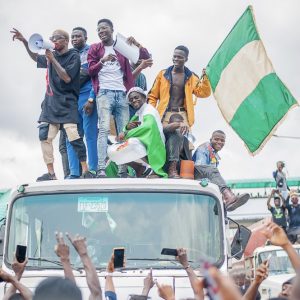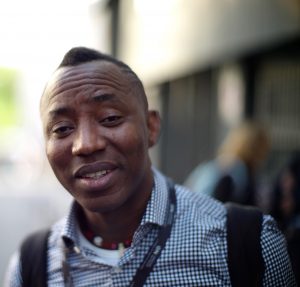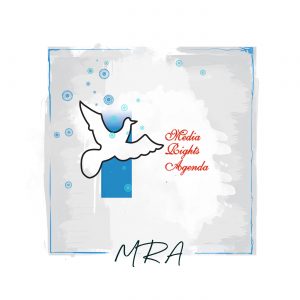Index relies entirely on the support of donors and readers to do its work.
Help us keep amplifying censored voices today.
On 25 February, Punch Newspaper journalist Gbenga Oloniniran stood near the Governor of Rivers State’s residence in Southern Nigeria, covering the recent presidential election. As policemen gathered and arrested young people at a polling station, Oloniniran brought out his camera, taking snapshots of the incident. Instantly, the policemen left the youths, pounced on Oloniniran, snatched his camera, and bundled him away in a van. They denied him the right to cover the elections.
This was not an isolated incident. At least 14 journalists and media workers covering the presidential election were detained, intimidated or attacked by security forces, political groups or citizens. During the state elections held on 18 and 19 March, at least 28 more journalists suffered the same treatment, with many more cases likely going unreported.
“They threatened me, and that was under the rain, and I was shivering,” Bolanle Olabimtan, a journalist at The Cable, told Index after she was attacked in Delta State. She was punched, and had the photos deleted from her phone.
Haruna Mohammed Salisu, CEO of WikkiTimes, was arrested while covering a protest during the presidential elections. He was detained and charged with inciting disturbance of public peace. He claims he had his phone taken, was interrogated by security personnel and was then assaulted by violent supporters of the governor.
“My experience in detention serves as a stark reminder of how vulnerable journalists are in Nigeria,” he wrote in WikkiTimes.
On March 18 unidentified men attacked an Arise TV crew consisting of reporter Oba Adeoye, cameraman Opeyemi Adenihun and driver Yusuf Hassan. Adenihun suffered facial injuries and their drone was seized. Meanwhile in Ogun State, Adejoke Adeleye, a News Agency of Nigeria reporter, was attacked by a mob when filming at a voting station. Five people, including one masked person wielding an axe, chased the group of journalists that included Adeleye, according to the Committee to Protect Journalists. In Lagos, 10 people hit reporter Amarachi Amushie and camera operator Aliu Adeshina from the privately-owned broadcaster Africa Independent Television, as they reported at a polling station. Security agencies issued threats. They harassed Adesola Ikulajolu, a freelance investigative reporter, deleting the image folder in his phone.
Nigeria is ranked at 129 out of 180 nations in the 2022 World Press Freedom Index compiled by Reporters Without Borders, with this latest assault on press freedom demonstrating part of the reason for the ranking.
After the attacks, Dupe Fehintola, Chairman of a branch of the Nigeria Union of Journalists, made a statement saying: “We condemn these attacks on journalists.”
During the elections, members of the Nigerian media investigated potential links between political parties and violent attackers, who threatened voters unless they proved they were casting their ballots in favour of the ruling All Progressives Party.
Adebola Ajayi, a journalist at People’s Gazette, experienced that violence first hand, saying: “I was attacked by political thugs at a polling unit in Orile-Oshodi ward in Lagos.”
This violence may have contributed to the fact that 71% of voters abstained from the elections. The election winner, APC’s Ahmed Tinubu, received only 8.8 million votes, while challengers Atiku Abubakar of the Peoples Democratic Party gathered 6.9 million and Peter Obi of the Labour Party received 6.1 million, in a country of 93 million registered voters and a population of over 200 million.
Evidence gathered by the media – including assaults on electoral officials and an incident where attackers destroyed ballot boxes with axes – showed that violence marked the elections. The pressure on journalists as they faced this violence themselves prevented them from covering the elections fairly.
Nearly two weeks after the end of the state and presidential elections, the media remains shaken.
“We strongly condemn these unacceptable attacks, which constitutes both the violation of fundamental human rights of the affected journalists and media worker and a major assault on press freedom,” Melody Akinjiyan, the spokesman of the International Press Center, Lagos, told Index.
[vc_row][vc_column][vc_column_text]

Recent protest in Nigeria. Credit: TobiJamesCandids/WikiCommons
A few weeks ago, Nigeria looked to be at breaking point. President Muhammadu Buhari had called in the army to quash large-scale protests that had filled the country’s streets.
Rather than allow peaceful protests, the army were responsible for a number of state killings as they fired upon their compatriots. For example, on 20th October, in the city of Lekki, around 12 people were killed, according to human rights group Amnesty International. This and other examples of violence shown on social media provoked real anger.
While the protests have died down, the desire for change has not gone away. With their right to free speech violently infringed upon by their own army, Nigerians are looking for alternative ways of protesting.
Poet and journalist Wana Udobang shed light on how the movement has adapted and on the feeling in the country.
“I think that hope was so high that by the time the 20th happened, and the army opened fire, we all encouraged people to stay home,” she said. “We all wanted change but nobody wanted people to die.”
“We have moved into the stage of [looking at] what we do strategically. If you go on social media, a lot of the talk is about getting young people into leadership and where they can make and impact change. There is an active movement for a more sustainable change. In a way, the protests were a first step in demanding for accountability and change. For a long time we were just voting between the devil and the deep blue sea.”
The protests originally began against the Nigerian police unit known as the “special anti-robbery squad”, or “SARS”, but have since become more of a protest aimed against police brutality and wider law enforcement. SARS was actually disbanded on 11 October, but demonstrations continued thereafter.
Udobang said: “It [the protests] was necessitated by the end SARS protests but I think that became like an umbrella for so many unjust things happening in the country.”
“I think [we are in] a kind of limbo period,” she said. “The protests were so hopeful. Everyone was going out every single day, people were donating food and money. It really was something where everyone felt like for the first time they could channel their energy towards something and we were all united for the first time in a very long time.”
Founded in 1992, the extra power given to SARS led to repeated incidents of police brutality and a unit that exercised fear over the civilians they were supposedly meant to protect.
Media freedom has been a notable victim of SARS brutality, with reporters repeatedly attacked and threatened by the unit. However, for a shift to take place, journalists must be protected. This, as well as being able to voice criticism towards the authorities, will be key to any kind of movement that brings about change.
“I think the role of journalists is incredibly important now,” noted Udobang. “This protest was happening during a global pandemic. A lot of the images shared were coming from Nigerians themselves. So the importance of documenting change, movements and what was essentially a massacre. The government did not acknowledge it.”
The country sits 115th in the World Press Freedom Index. Press freedom protection organisation Reporters Without Borders describe why Nigeria is so low down the rankings.
“Nigeria is now one of West Africa’s most dangerous and difficult countries for journalists, who are often spied on, attacked, arbitrarily arrested or even killed,” they said.
“The defence of quality journalism and the protection of journalists are very far from being government priorities. With more than 100 independent newspapers, Africa’s most populous nation enjoys real media pluralism but covering stories involving politics, terrorism or financial embezzlement by the powerful is very problematic.”
“Journalists are often denied access to information by government officials, police and sometimes the public itself.”
While the true impact the protests have had on Nigeria and its institutions is currently unclear, the demonstrations seem like a turning point for people in the country. Let’s hope it leads to more freedoms.
[/vc_column_text][/vc_column][/vc_row][vc_row][vc_column][three_column_post title=”You may also like to read” category_id=”5641″][/vc_column][/vc_row]

Omoyele Sowore (Photo: Mohamed Nanabhay / Wikipedia)
United Nations Working Group on Arbitrary Detention
United Nations Special Rapporteur on the promotion and protection of the right to freedom of opinion and expression, Mr David Kaye
United Nations Special Rapporteur on the rights of freedom of peaceful assembly and of association, Mr Clément Nyaletsossi Voulé
United Nations Special Rapporteur on the situation of human rights defenders, Mr Michel Frost
African Commission on Human and Peoples’ Rights Special Rapporteur on Freedom of Expression and Access to Information, Mr Lawrence Murugu Mute
African Commission on Human and Peoples’ Rights Special Rapporteur on Human Rights Defenders and Focal Point on Reprisals in Africa, Prof. Rémy Ngoy Lumbu
London, 23 August 2019
To the members of the Working Group and the Special Rapporteurs:
We, 48 human rights and press freedom organisations, respectfully request that you consider this urgent appeal in relation to the arrest and arbitrary detention of Nigerian journalist and human rights defender Omoyele Sowore who was arrested by the authorities following a call for peaceful protest. We request that you urgently intervene to secure the immediate release of Mr Sowore and declare his arrest and detention a gross violation of his human rights, including the right not to be arbitrarily detained as protected by Article 9(1) of the International Covenant on Civil and Political Rights (ICCPR) and Article 6 of the African Charter on Human and Peoples’ Rights (the Banjul Charter); the right to a fair trial as protected by Article 14 ICCPR and Article 7 of the Banjul Charter; the right to freedom of expression as protected by Article 19 ICCPR and Article 9 of the Banjul Charter; the right of freedom of peaceful assembly and of association as protected by Articles 21 and 22 ICCPR and Articles 10 and 11 of the Banjul Charter; and his rights as a human rights defender as outlined in the 1999 UN Declaration on Human Rights Defenders and 2017 African
Commission Cotonou Declaration on strengthening and expanding the protection of all Human Rights Defenders in Africa.
Background
Challenging government corruption and speaking truth to power has been the constant thread throughout Mr Sowore’s career, from the leading of student protests in the 1990’s to his recent campaign running for Presidential office in Nigeria.
Omoyele Sowore’s arrest and detention
Mr Sowore’s call for a peaceful #RevolutionNow protest
The objective of the protest was to demand that the Nigerian government end corruption and economic inequality and guarantee education to all. That the protest Mr Sowore and the Coalition for Revolution (CORE) movement he founded called for was a peaceful one is made clear at the very outset of the call for protest, issued on 27 July, which starts by setting out the “rules of engagement”:
We eschew all forms of violence. No protester should throw any object as little as stones or attack any security officials. We are aware of their intent to provoke the mass unduly by using undue tactics and sponsored agents, so as to give the protest a bad name. We encourage all Nigerians to remain calm as we are ready to fight these injustices to a logical conclusion.
Request for urgent action
Please do not hesitate to contact us if you have any questions or if we can provide you with any additional information you may need.
Yours sincerely,
All Workers’ Convergence (AWC)
Afrika Movement for Freedom and Justice (AMFJ)
Agege Women Agenda (AWA)
ARTICLE 19 Senegal/West Africa
Centre for Constitutional Rights
Centre for Human Rights and Social Justice (CHRSJ)
Chidi Odinkalu Former Chairman, National Human Rights Commission (Nigeria) & Senior Fellow, Open Society Justice Initiative
Coalition for Revolution (CORE)
Committee for the Defence of Human Rights (CDHR)
Community Women Initiatives (CWI)
The Concerned Forum
Congress of Progressive Youths (COPY)
Democratic Youth League
Edo State Civil Society Organisation (EDOSCO)
Enough is Enough (EiE) Nigeria
Freedom of Expression Hub
Gani Fawehinmi Apostles
Gani Fawehinmi Memorial Organization (gafam.org)
Governance Advancement Initiative for Nigeria (GAIN)
Global Voices Sub-Saharan Africa
Grassroot Justice Centre
Human and Environment Development Agenda (HEDA)
Human Rights Network for Journalists-Uganda (HRNJ-UGANDA)
IAmVocal
Index on Censorship
Media Legal Defence Initiative
Media Rights Agenda
Moshood Abiola Vanguard for Democracy (MAVD)
Movement For People’s Rights
National Conscience Party (NCP), Lagos State Branch
Nigerians in Diaspora Europe, Belgium-Luxembourg (NIDOE-BeLux)
Open Society for West Africa (OSIWA), Nigeria Office
Paradigm Initiative
People’s Alternative Front (PAF)
Peoples’ Unite
Rivers State Civil Society Coalition (RIVSCO)
Rule of Law and Accountability Advocacy Centre (RULAAC)
Save Lagos Group
Socialist Vanguard Tendency (SVT)
Socio-Economic Rights and Accountability Project (SERAP)
Sovereign Vital Force
Spaces for Change
Take-It-Back (TiB) Movement
Talakawa Parliament
Veteran Group for Operation Clean Crusade (VGOCC)
Women for Leadership Change
Workbond International Network (WIN)
Youth In Good Governance Initiative (YIGGI)
[vc_row][vc_column][vc_video link=”https://youtu.be/2DupMR8Kao8″][vc_column_text] Media Rights Agenda (MRA) is a non-profit organisation that has spent the last two decades working to improve media freedom and freedom of expression in Nigeria by challenging the government in courts.
Media Rights Agenda (MRA) is a non-profit organisation that has spent the last two decades working to improve media freedom and freedom of expression in Nigeria by challenging the government in courts.
While the 1999 Constitution of the Federal Republic of Nigeria guarantees the right to freedom of expression, other laws – including the sections of the Criminal Code, the Cybercrimes Act and the Official Secrets Act – limit and even criminalise expression.
Through its active legal team, MRA has initiated strategic litigation targeting dozens of institutions, politicians and officials with the aim of improving the country’s legal framework around media freedom. Its persistent campaigning and lawsuits around freedom of information have helped improve access to government-held data.
A notable example is MRA’s work on Nigeria’s Freedom of Information Act. The organisation campaigned for over a decade to ensure Nigeria adopted its own FOI Act, and even wrote a draft of the bill. Although an FOI act was finally passed, many states and institutions are not complying with the new law.
So far, the organisation has found 66 institutions and two judges that still fail to comply with the act – and has named, shamed and at times sued them. It continues to have many active court cases against government officials and institutions over over the application of the act.
MRA has since also provided pro bono legal services to journalists, including FOI litigation to implement the act, and FOI training to over 2,000 journalists and organisations.
MRA also draws attention to attacks on journalists and the media through its website.
MRA and its partners are also currently challenging the repressive provisions of Nigeria’s Cybercrimes Act, and the case is currently pending at the Nigerian Supreme Court. The Section 24 of the 2015 law has been used by the country’s politicians to accuse journalists of cyberstalking for the publication of critical articles.
At the continental level, MRA was among the organisations that campaigned against internet shutdowns in Africa. The campaign resulted in a resolution by the African Commission on Human and People’s Rights affirming the rights of all Africans to free expression online.
MRA was also one of the organisations that worked to develop the African Declaration on Internet Rights and Freedoms and the African Platform on Access to Information (APAI) Declaration. [/vc_column_text][vc_separator][vc_row_inner][vc_column_inner width=”1/2″][vc_single_image image=”104691″ img_size=”full” onclick=”custom_link” link=”https://www.indexoncensorship.org/2019/01/awards-2019/”][/vc_column_inner][vc_column_inner width=”1/2″][vc_column_text]
Index on Censorship’s Freedom of Expression Awards exist to celebrate individuals or groups who have had a significant impact fighting censorship anywhere in the world.[/vc_column_text][/vc_column_inner][/vc_row_inner][vc_separator][/vc_column][/vc_row][vc_row][vc_column][vc_basic_grid post_type=”post” max_items=”4″ element_width=”6″ grid_id=”vc_gid:1552057575584-da476382-369c-6″ taxonomies=”26925″][/vc_column][/vc_row]